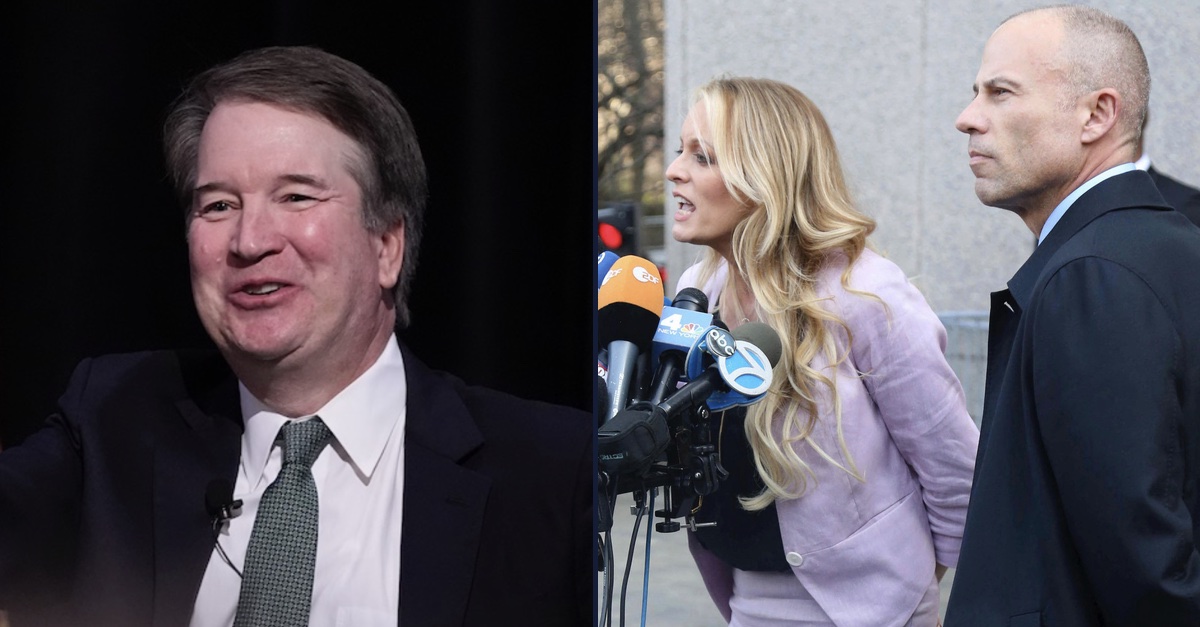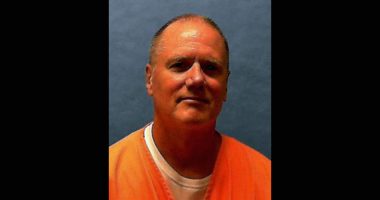
Left: Justice Brett Kavanaugh speaks during a judicial conference on May 10, 2024, in Austin, Texas (AP Photo/Eric Gay). Right: Stormy Daniels and her then lawyer Michael Avenatti hold a press conference in 2018 following a federal court hearing for then President Donald Trump’s then lawyer, Michael Cohen (zz/KGC-146/STAR MAX/IPx).
Federal inmate Michael Avenatti didn’t get any closer the second time around asking the U.S. Supreme Court to hear his case for overturning his convictions, and once again Justice Brett Kavanaugh sat on the sidelines.
In an orders list on Tuesday, the high court declined to disturb Avenatti’s conviction for aggravated identity theft for the fraud the disgraced lawyer and Donald Trump nemesis perpetrated on his former client Stephanie Clifford, better known as Stormy Daniels, in the course of forging her signature and stealing $300,000 in book deal proceeds.
In September, Avenatti insisted that his case was a “clean vehicle” for resolving a circuit split on “evaluating aggravated identity theft cases” in light of the 2023 decision in Dubin v. United States.
“This Court’s review is warranted to resolve this split, before it becomes more entrenched and risks sowing mischief and confusion in the lower courts,” Avenatti’s petition for a writ of certiorari said.
On Sept. 20, U.S. Solicitor General Elizabeth Prelogar made clear that the government wanted no part of having to respond to Avenatti’s petition absent an order from the justices.
“The Government hereby waives its right to file a response to the petition in this case, unless requested to do so by the Court,” Prelogar said.
The court made no such request and rejected his petition without comment, only saying that Justice Kavanaugh “took no part in the consideration or decision of this petition.”

That amounted to a replay of what took place in May, when SCOTUS refused — without input from Kavanaugh — to review Avenatti’s convictions for extorting Nike.
As Law&Crime noted at the time, Avenatti and Kavanaugh have a history. Avenatti once represented Julie Swetnick, a woman who publicly accused the then Supreme Court nominee of “gang rape.”
When Swetnick went on NBC with her story, she said, “I cannot specifically say that [Kavanaugh] was one of the ones who assaulted me.”
Still, she described Kavanaugh as a “very aggressive — very sloppy drunk, very mean drunk” who, at parties in the 1980s, would “go up to girls and paw on them, try to, you know, get a little too handsy, touching them in private parts.”
Kate Snow, the NBC interviewer, noted that none of the four people Swetnick said would or could corroborate her claims did so. One of those people was dead, two others offered no response, and the last person didn’t remember Swetnick.
Just days before that interview, an ex-boyfriend of Swetnick’s said that he once got a restraining order against her.
“Right after I broke up with her, she was threatening my family, threatening my wife and threatening to do harm to my baby at that time,” the man told Politico in 2018, adding, “She’s not credible at all.”
Criminal referrals for false statements followed. After Kavanaugh was confirmed to the Supreme Court, Avenatti dismissed criticism that his representation of Swetnick backfired.
Avenatti remains on track to be let out of prison at the end of July 2035, Bureau of Prisons records reviewed by Law&Crime show.
Have a tip we should know? [email protected]







